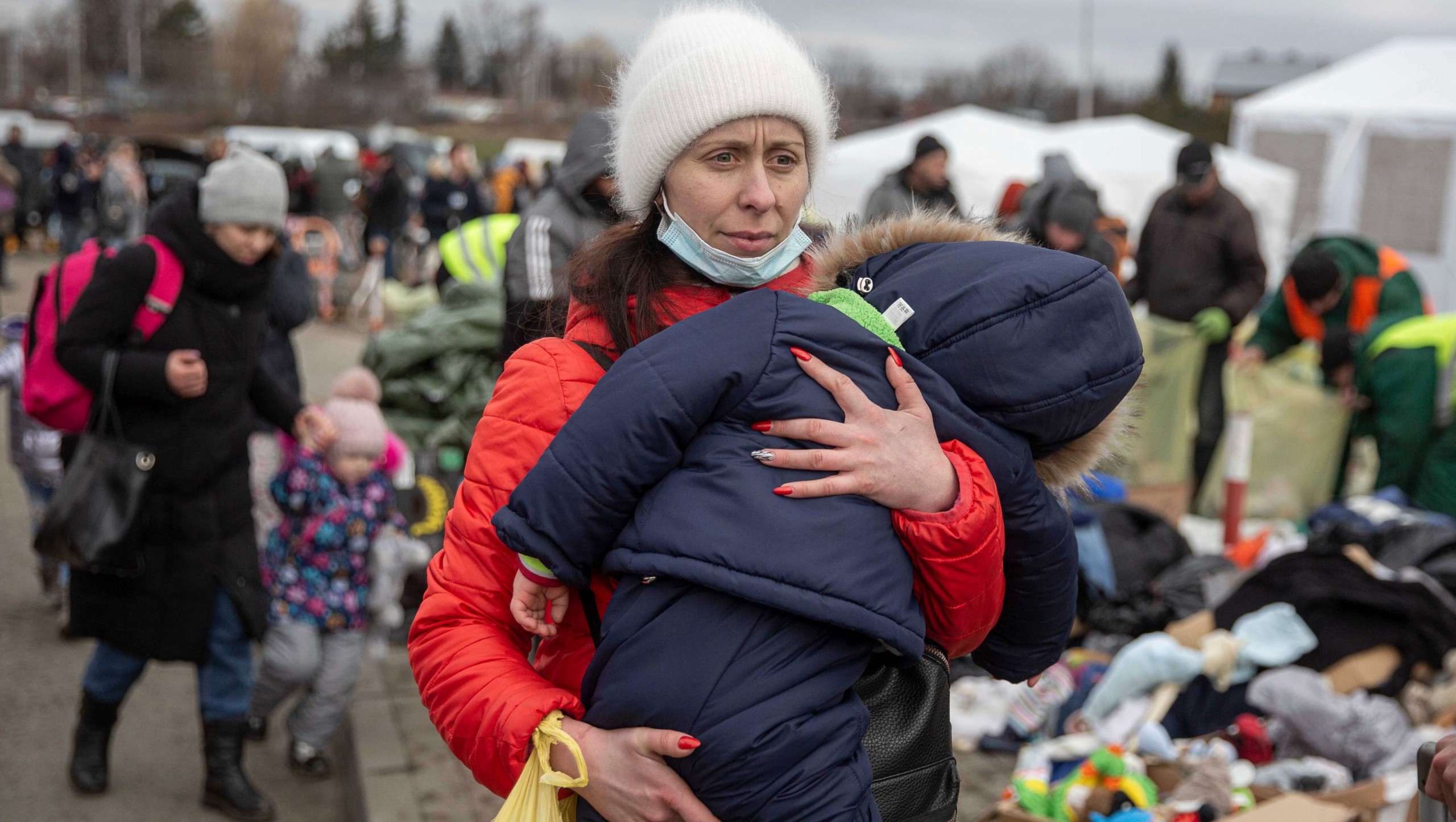By Jerry Avenaim | EXECUTIVE DIRECTOR |
Thank you for taking a moment to read this article about practical steps you can take to help support Ukrainian refugees here in the US and abroad.

As the founder of the Mental Health Foundation, I wanted to take a moment to use our platform to reach our subscribers and followers with a message about Ukrainian refugees, mental health conditions they may be facing, and ways to help. For the most part, while we are thousands of miles away from everything that is taking place, there are still things we can do to help those suffering because of this tragic conflict.
By Jerry Avenaim | EXECUTIVE DIRECTOR |
Thank you for taking a moment to read this article about practical steps you can take to help support Ukrainian refugees here in the US and abroad.

As the founder of the Mental Health Foundation, I wanted to take a moment to use our platform to reach our subscribers and followers with a message about Ukrainian refugees, mental health conditions they may be facing, and ways to help. For the most part, while we are thousands of miles away from everything that is taking place, there are still things we can do to help those suffering because of this tragic conflict.
Introduction
The ongoing conflict in Ukraine has forced many people to flee their homes in search of safety, and they often find themselves in shelters in neighboring countries or farther afield like here in the US.
For those who end up in camps, while they have escaped the immediate danger from the conflict, they can still find themselves in difficult conditions with limited access to food, clean water and medical care.
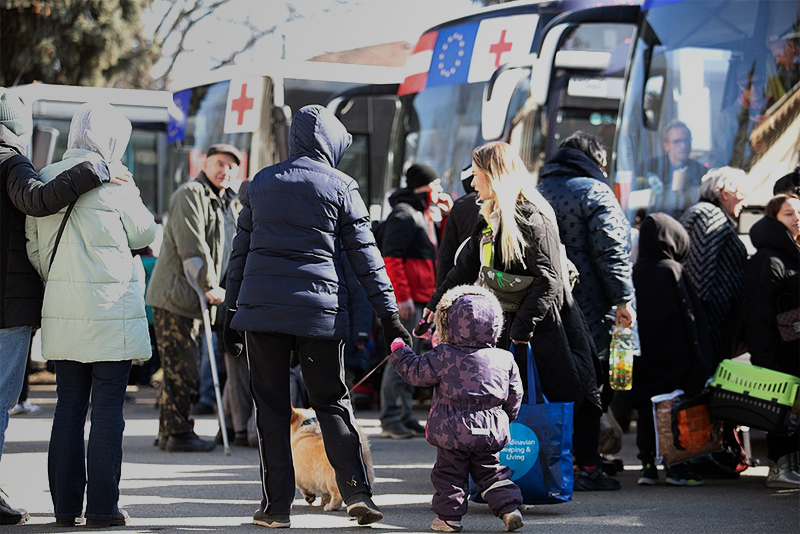
Ukrainian refugees boarding busses in Poland – Kyivcity.gov.ua, CC BY 4.0, via Wikimedia Commons
According to the UN Refugee Agency, over 5.9 million Ukrainians are now refugees or internally displaced persons. That’s a lot of people in need of assistance, and there are several organizations working to help them, but you can still make a difference in the lives of those affected by the conflict.
If you’re looking for a way to get involved, here are some things you can do:
- Educate yourself about the issues
- Join support groups or online communities
- Volunteer your services
- Donate money
- Donate supplies and clothing
- Sponsoring a family
Educate yourself
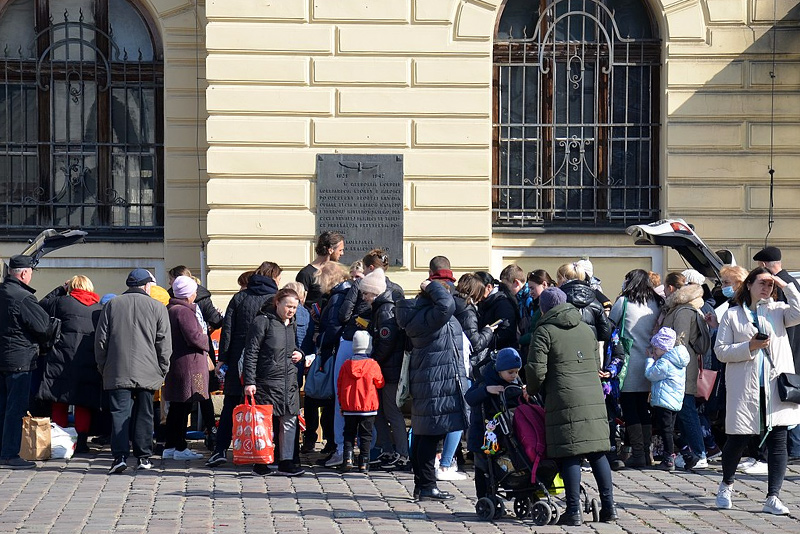
Ukrainian refugees picking up food and supplies – Silar, CC BY-SA 4.0, via Wikimedia Commons
Educate yourself about the issues facing Ukrainian refugees and learn about the specific challenges they face since leaving their country.
Rated among the worst refugee crisis in recent history, many of those fleeing have seen loved ones killed or injured, and face PTSD and other mental health issues as a result of this unprecedented crisis. The more informed you are, the better equipped you will be to help them effectively with your time and resources.
Join support groups
Join support groups or online communities that are dedicated to helping Ukrainian refugees. Many of these groups have information about where help is needed the most and how you can get involved to help those who are now living in cramped and overcrowded conditions or in a strange country, with little hope for the future.
Volunteering your services
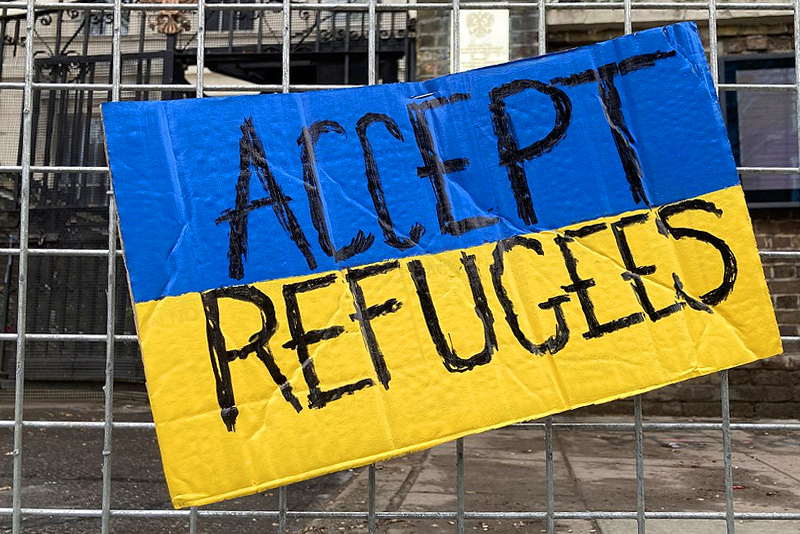
Refugee poster on Ukrainian flag in London – Matt Brown from London, England, CC BY 2.0, via Wikimedia Commons
Volunteering your services if you have some spare time to lend a hand at any local shelters or refugee centers. Research organizations that are helping refugees who have fled their homes and communities, they have been through a lot, and may have been forced to travel with nothing more than the clothes on their backs. Many refugees arrive with nothing but the clothes on their backs, and they need all the help they can get. For those wanting to volunteer in Ukraine, check out these sites for more information:
Donate money
Donate money, and your donation will go towards providing essential supplies and services. Alternatively, some people choose to donate to Airbnb to support people needing a place to stay, and 100% of your donation goes to those in crisis, and Airbnb has an initiative to help facilitate housing those who are displaced.
Another more personal alternative is to join the ‘Pay don’t stay’ movement where people book Airbnb stays in Ukraine, but have no intention of staying there.
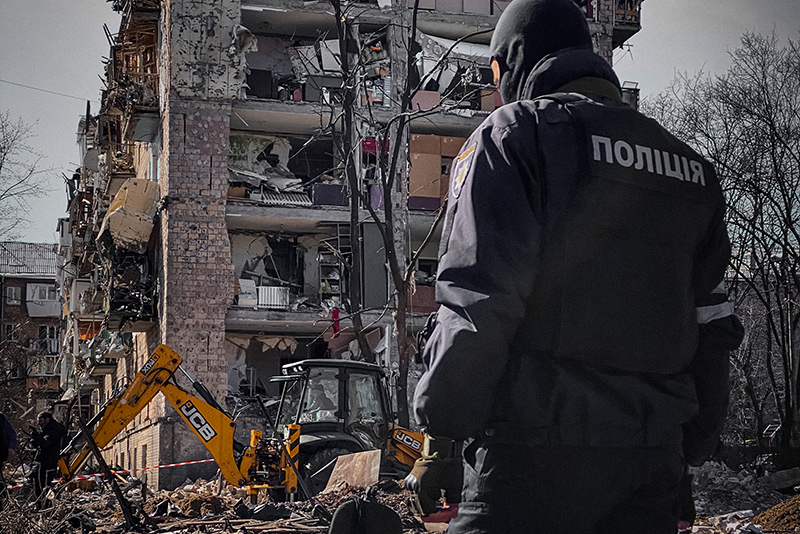
Ukrainian policeman outside a bombed out apartment building.
Reputable charitable organizations working on behalf of Ukrainian refugees include:
- UNICEF
- Red Cross
- Doctors without Borders
- Save The Children
- World Vision
- UN Refugees
- Oxfam
- American Jewish Joint Distribution Committee
- Care
- Sunflower of Peace
- International Medical Corps
- Convoy Of Hope
- United Way
- World Central Kitchen
- Global Empowerment Mission
- Kidsave
- Americares
- WHO
- International Rescue Committee
- USUKRAINE
- Kyiv School of Economics
- Direct Relief
- UA Hospitals
Donate supplies
Donate supplies and clothing to shelters or refugee centers. Refugees often arrive with very little, so donations of clothes, toiletries and other essential items are always welcome.
It is especially important to validate any organization you plan to send aid to those suffering directly as a result of the conflict in Ukraine. Charity navigator has put together a list of charity nonprofits who are helping, and each organization is listed with a 5 star rating system indicating the organizations financial efficiency and transparency.
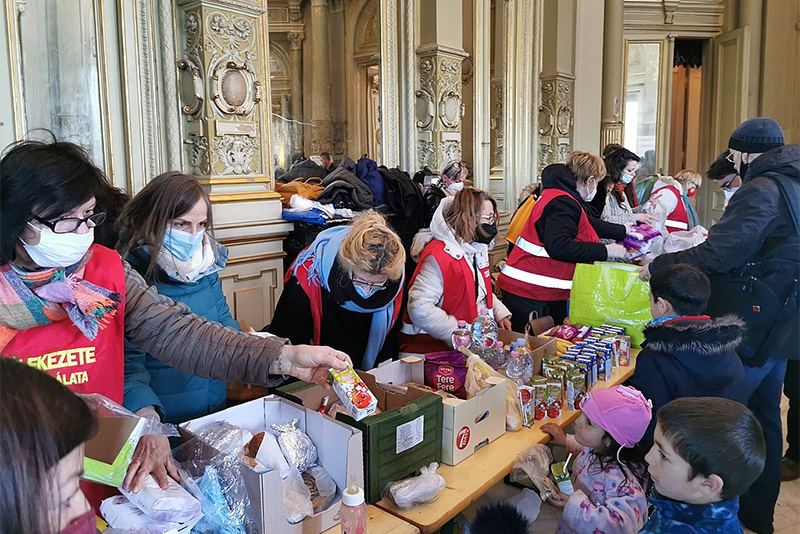
Handing out food and essentials to Ukrainian refugees in Hungary – Elekes Andor, CC BY-SA 4.0, via Wikimedia Commons
The categories for nonprofits include:
- Medical Services
- Medical Supplies
- Non-Medical Supplies (inc. food)
- Water, Sanitation, and Hygiene (WASH)
- Emergency Housing
- Long-Term Assistance
- Other (inc. cash/cash vouchers, logistic supply, animals)How to avoid scams
In addition to being able to validate these nonprofits, for those considering making financial contributions, check out this CNBC article about how to avoid fundraising scams which includes mentions of various organizations like Charity Navigator, Charity Watch, and BBB Wise Giving Alliance.
By far, the leading destination for refugees has been their neighboring country – Poland. With a relatively small number of those fleeing the conflict actually making it to the US, cities like Sacramento, Seattle, Chicago and New York that have more Ukrainian immigrants than other locations could prove to provide opportunities for in person donations of supplies, or volunteering. If you have the opportunity to help in person, keep this link to the Ukrainian phrasebook from Duolingo on your phone to help with communication and so you can make the refugees feel a little less far from home.
Sponsoring a family
Sponsoring a family could for many families or individuals be the more significant spend of both time and resources to help a Ukrainian refugee family. With the launch of a new government program called Uniting for Ukraine under the Biden administration, up to 100,000 Ukrainians will be welcomed into the United States.
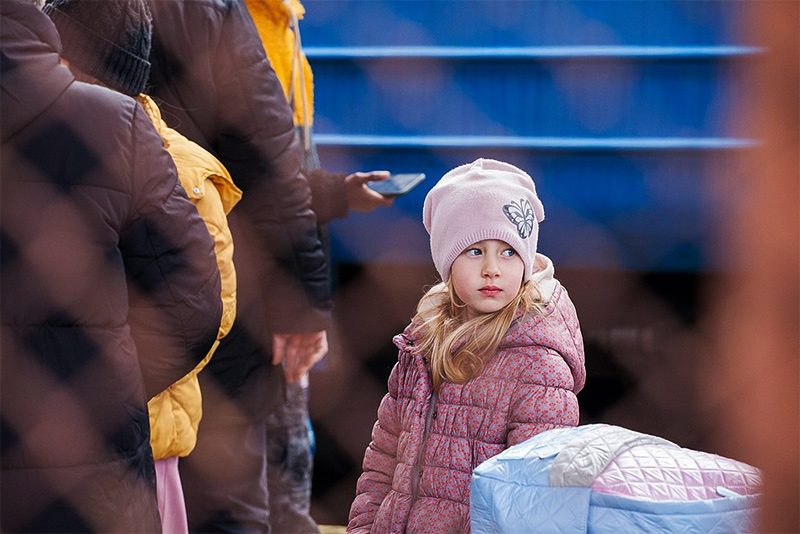
Ukrainian refugee girl waiting to board a bus – Mirek Pruchnicki from Przemyśl, Sanok, Polska, CC BY 2.0, via Wikimedia Commons
The goal of the program is to provide a safe and orderly path for those fleeing Ukraine to apply for a parole which would allow them to stay for up to 2 years and also permit them to work during their stay in the US.
When individuals or families sign up to sponsor a family, despite the potential for the refugees to be granted permission to work here, the sponsoring family have to commit to providing financial support for the duration of their time in the US.
A Word About Mental Health
For the men, women and children of Ukraine, regardless of whether or not they left their country or remained behind, the events that have unfolded since February of 2022 will result in the exacerbation of pre-existing mental health conditions, or the first time diagnosis for many people.
Among the most common conditions likely to be seen in refugees the list includes:
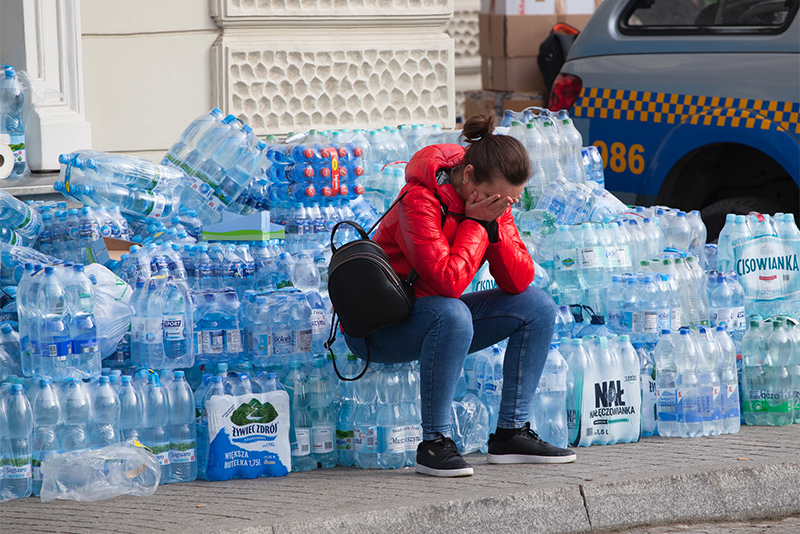
Refugee sitting on cases of water bottles in Poland – Mirek Pruchnicki from Przemyśl, Sanok, Polska, CC BY 2.0, via Wikimedia Commons
Various studies of settled refugees indicate rates of PTSD ranging between 15-40% and between 5-15% for major depressive. Factors that contribute to the development of these conditions include the frequency, duration, and severity of exposure to traumatic events, as well as the stress and anxiety caused by being in a new country, language barriers, and delays in finding asylum. In addition to dealing with these conditions, with potential delays in being seen by the appropriate healthcare professionals, some also face a potential risk of substance dependency and suicide.
There are many ways to help refugees in Ukraine, so choose the one that aligns with your abilities and interests. Whatever you do, you’ll be making a difference in the lives of those who need it most.
Subscribe to get notifications about future articles.
About the Author: Jerry Avenaim – EXECUTIVE DIRECTOR


